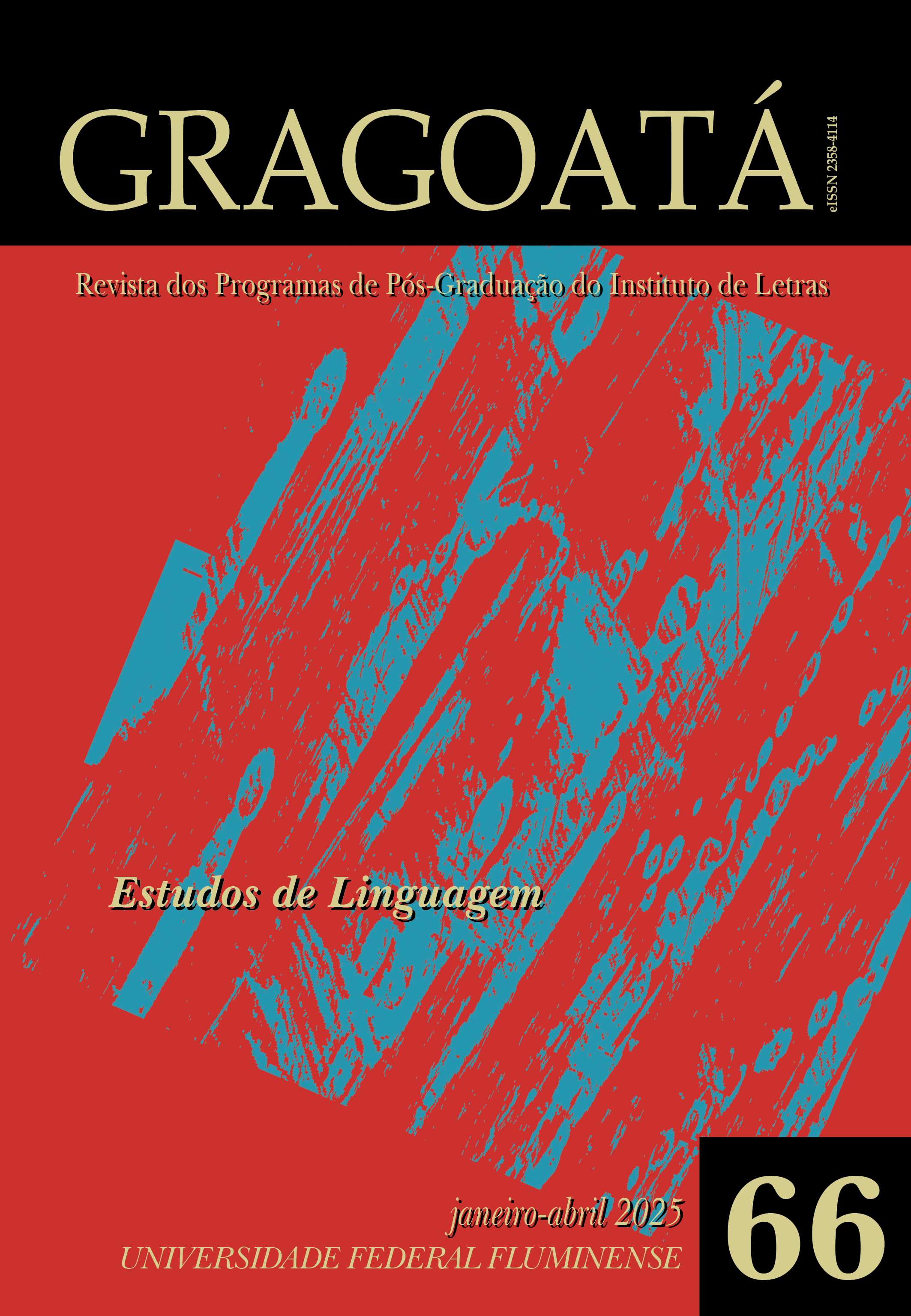Políticas linguísticas e acolhimento intercultural de crianças, jovens e adultos indígenas da etnia Warao no Piauí
DOI:
https://doi.org/10.22409/gragoata.v30i66.64495.ptPalavras-chave:
Políticas Linguísticas, Interculturalidade, Translinguagem, WaraoResumo
O trabalho apresenta as experiências de formação e acompanhamento de educadores envolvidos nos projetos Alfabetização sem Fronteiras, da Secretaria Municipal de Educação (SEMEC) de Teresina-PI, e Educação de Jovens e Adultos (EJA) Nebu Tuma-Daomata Tane Naminakitane, da Secretaria de Educação do Estado do Piauí (SEDUC-PI). Trata-se de ações desenvolvidas com indígenas da etnia Warao, oriundos da Venezuela, que se encontram em situação de refúgio, na capital piauiense. Ao vislumbrarmos a potência dessas experiências como exemplos de vivências interculturais, translíngues e freirianas de acolhimento, cogitamos visibilizar as políticas linguísticas consideradas nos processos de letramentos e de mobilização de repertórios com estudantes da etnia, na rede pública municipal e estadual de ensino daquela cidade. Para tanto, foram realizadas observações de aulas com crianças e adolescentes nas escolas da SEMEC, bem como a coleta de materiais utilizados na experiência com adultos da SEDUC-PI. Espera-se que a visibilização daquelas ações e a produção de caderno pedagógico com orientações para educadores no contexto do EJA Intercultural Warao possam contribuir, não apenas para a continuidade da inclusão dessa comunidade vulnerabilizada socioeconomicamente, mas também para o aprofundamento de políticas educacionais que se comprometam com a garantia de seus direitos linguísticos no Brasil.
Downloads
Referências
BRANDÃO, Carlos Rodrigues. O que é o método Paulo Freire. São Paulo: Editora Brasiliense, 1991.
BAKHTIN, Mikhail. Os gêneros do discurso. São Paulo: Editora 34, 2016.
BIZON, Ana Cecília Cossi; DINIZ, Leandro Rodrigues Alves. Uma proposta poscolonial para a produção de materiais didáticos de português como língua adicional. Línguas e Instrumentos Linguísticos, Campinas, n. 43, p. 155-191, 2019.
BIZON, Ana Cecília Cossi; CAMARGO, Helena Regina Esteves de. Acolhimento e ensino da língua portuguesa à população oriunda de migração de crise no município de São Paulo: por uma política do atravessamento entre verticalidades e horizontalidades. In: BAENINGER, Rosana et al. (org.). Migrações Sul – Sul. Campinas: Nepo; Unicamp, 2018. p. 712-726.
BRASIL. Ministério da Educação. Referencial curricular nacional para as escolas indígenas. Secretaria de Educação Fundamental. Brasília: MEC/SEF, 1998.
BRASIL. Ministério da Educação. Base Nacional Comum Curricular. Brasília: Brasil, 2018.
CALVET, Louis-Jean. As políticas linguísticas. São Paulo: Parábola; Florianópolis: IPOL, 2007.
DEFAYS, Jean-Marc. La langue française étrangère et seconde. Bruxelles: Éditions Mardaga, 2015.
DESCHAINE, Mark; SHARMA, Sue Ann. A. The five Cs of Digital Curation: supporting twenty-first-century teaching and learning. Insight: A Journal of Scholarly Teaching, v. 10, n. 1, p. 19-24, 2015.
DINIZ, Leandro Rodrigues Alves; NEVES, Amélia de Oliveira. Políticas linguísticas de (in)visibilização de estudantes imigrantes e refugiados no ensino básico brasileiro. Revista X, v. 13, n. 1, p. 87-110, 2018.
FERREIRA, Deise Viana. Afrolatinidade e educação. In: LANDULFO, Cristiane; MATOS, Doris (org.). Suleando conceitos em linguagens: Decolonialidade e espistemologias outras. Campinas: Editora Pontes, 2022. p. 17-23.
FREIRE, Paulo. A importância do ato de ler em três artigos que se completam, 49ª ed. São Paulo: Cortez, 2008.
FREIRE, Paulo. Pedagogia da autonomia, 57ª ed. Rio de Janeiro; São Paulo: Paz e Terra, 2018.
FREIRE, Paulo. Pedagogia do Oprimido, 64ª ed. Rio de Janeiro; São Paulo: Paz e Terra, 2017.
KALANTZIS, Mary; COPE, Bill; PINHEIRO, Petrilson. Letramentos. Campinas: Editora da Unicamp, 2020.
LAGARES, Xoán Carlos. Qual política linguística? Desafios glotopolíticos contemporâneos. São Paulo: Parábola, 2018.
MENDES, Edleise. Educação linguística intercultural. In: LANDULFO, Cristiane; MATOS, Doris (org.). Suleando Conceitos em linguagens: Decolonialidade e epistemologias outras, 1.ed. Campinas: Pontes Editores, 2022. p. 123–132.
MENEZES, Vera Lúcia. A pesquisa Narrativa. In: MENEZES, Vera Lúcia. Manual de pesquisa em estudos linguísticos. São Paulo: Parábola, 2019. p. 87-95.
PETERS SALGADO, Ana Claudia et al. Translanguaging e justiça social: Por uma mudança de perspectiva. Polifonia, v. 29, n. 53, p. 15-40, 2023. Disponível em: https://periodicoscientificos.ufmt.br/ojs/index.php/polifonia/article/view/14857. Acesso em: 9 ago. 2023.
PINHEIRO, Petrilson et al. Sentidos sem fronteiras para uma educação linguística transformadora: translinguagem e transposição na era do significado multimodal e mediado digitalmente em tempos pandêmicos. Cadernos de Linguagem e Sociedade, v. 22, n. 2, p. 331-352, 2021.
POZA, Luis. Translanguaging: Definitions, Implications, and Further Needs in Burgeoning Inquiry. Berkeley Review of Education, v. 6, n. 2, 2018.
ROSA, Acassia dos Anjos Santos. Áreas culturais latino-americanas. In: LANDULFO, Cristiane; MATOS, Doris. Suleando conceitos e linguagens: decolonialidades e epistemologias outras. Campinas: Pontes Editores, 2022. p. 25-32.
SOARES, Inês Virgínia Prado. Direito à diversidade linguística no Brasil e sua Proteção Jurídica. In: Anais do I Seminário Ibero-americano da diversidade linguística. 1, 2014, Foz do Iguaçu. Anais [...]. Foz do Iguaçu: UNILA, 2014. p. 66-93.
VENEZUELA. MINISTÉRIO DE EDUCACIÓN. Guía Pedagógica Warao para la Educación Intercultural Bilíngue. Dirección General de Asuntos Indígenas. Caracas-Venezuela, 2004.
VERONELLI, Gabriela; DAITCH, Silvana Letícia. Sobre a colonialidade da linguagem. Revista X, v. 16, n. 1, 2021. Disponível em: https://revistas.ufpr.br/revistax/article/view/78169. Acesso em: 31 ago. 2024.
Downloads
Publicado
Edição
Seção
Licença
Copyright (c) 2025 Gragoatá

Este trabalho está licenciado sob uma licença Creative Commons Attribution 4.0 International License.
AUTORIZAÇÃO
Autores que publicam em Gragoatá concordam com os seguintes termos:
Os autores mantêm os direitos e cedem à revista o direito à primeira publicação, simultaneamente submetido a uma licença Creative Commons Atribuição 4.0 Internacional (CC BY 4.0), que permite o compartilhamento por terceiros com a devida menção ao autor e à primeira publicação pela Gragoatá.
Os autores podem entrar em acordos contratuais adicionais e separados para a distribuição não exclusiva da versão publicada da obra (por exemplo, postá-la em um repositório institucional ou publicá-la em um livro), com o reconhecimento de sua publicação inicial na Gragoatá.
A Gragoatá utiliza uma Licença Creative Commons - Atribuição CC BY 4.0 Internacional.











